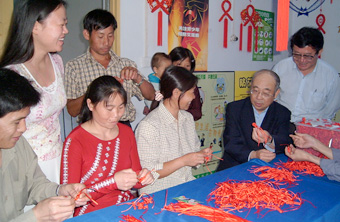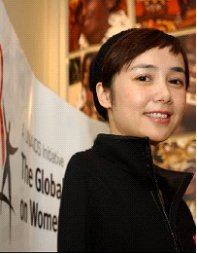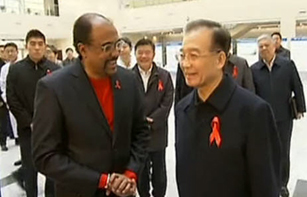World leaders call on South-South cooperation to reverse the AIDS epidemic and lead an integrated approach to accelerate progress towards the Millennium Development Goals
NEW YORK, 22 September 2010—World leaders gathered at the United Nations called for a new model of partnership to strengthen the AIDS response and achieve broader health and development outcomes. Without synergy between AIDS and other health and development initiatives, the leaders agreed sustainable progress towards global goals to end poverty and ensuring healthy societies will not be achieved.
A high-level meeting co-hosted by China, South Africa, Nigeria, Ethiopia and UNAIDS brought together world leaders including the Premier of China, the Prime Minister of Ethiopia and Ministers from South Africa, Nigeria, Burundi, Democratic Republic of Congo, Kenya, and Rwanda. They were joined by heads of international organizations and civil society.
"The era of health and development programmes operating in isolation is over,” said Mr Michel Sidibé, UNAIDS Executive Director, who chaired the meeting. “We have to work together to make this one movement—we cannot afford to have a fragmented approach to health and development. This Africa-China partnership can be the engine that accelerates progress towards the MDGs.”
Developing countries are joining hands to push for a combined approach to health and development and giving communities a strong voice in defining their health needs. The new South-South partnership will promote innovation, local solutions that make a difference, sharing of technology, and building local capacities.
The AIDS epidemic is stabilizing globally and new infections are steadily declining around most of the world. This has been possible as the international community has made significant progress in achieving goals towards universal access to HIV prevention, treatment, care and support.
"We cannot turn a deaf ear to the call of life, and we must not be slow in reaching out,” said H.E. Wen Jiabao, Premier of China. “We should redouble our effort to advance the global campaign against HIV/AIDS and ensure that the related MDGs be met on schedule. China has been actively involved in the international cooperation on HIV/AIDS prevention and treatment."
Endorsing the UNAIDS approach of “AIDS plus MDGs”, the leaders called for the AIDS movement to take the lead in bringing about integration and innovation.
“The ‘AIDS plus MDGs’ approach seeks to bring about change that will create a new dimension of performance. Not just in the response to AIDS, but also in efforts to achieve other MDGs, accelerating progress on those that are trailing behind,” said Dr Asha-Rose Migiro, UN Deputy Secretary-General. “Progress towards reversing the HIV epidemic is therefore central to the broad international development agenda.”
Investments in AIDS have contributed to strengthening health systems and primary health care as well as better access to social welfare programmes in many countries. In Ethiopia, a strong, results-driven alliance between the Ethiopian Government and its key development partners is producing win-win results by channelling more than US$ 300 million of AIDS resources to strengthen the county’s health systems.
“Ethiopia’s strategy to integrate AIDS and health issues has not only decreased the burden on health facilities, but it has also enabled the health system to reach the vulnerable and poor,” said H.E. Meles Zenawi, Prime Minister of Ethiopia. “Community ownership of development has helped us achieve progress that is sustainable over time.”
South Africa has integrated HIV and TB services under one roof, reducing both AIDS and Tuberculosis-related deaths. Under its ambitious programme to test 15 million people for HIV, it is offering comprehensive health checkups for women and girls. In 2009, nearly 90% of all pregnant women were able to access treatment to protect their babies from being born with HIV.
“We have to strengthen primary health care services that integrate HIV, maternal and child health, sexual and reproductive health into development,” said Dr. Aaron Motsoaledi, Health Minister of South Africa. “Communities must own the health agenda which is at the centre of their own development.”
However, HIV continues to hamper progress in reducing maternal and child mortality in many sub-Saharan countries. More than 40% of all maternal mortality in countries such as Botswana (77%), Swaziland (75%), Lesotho (59%) and Zimbabwe (53%), Namibia (50%), South Africa (43%) is attributable to HIV. Where health services are integrated, the results have been spectacular. In Pampaida, Nigeria, a Millennium Development Village in Kaduna state, there have been very few maternal deaths or children born with HIV in recent years, thanks to an integrated approach to health care delivery.
“We are saving mothers and children by strengthening the health system,” said Professor Onyebuchi Chukwu, Health Minister of Nigeria. “We are investing in health using resources from debt relief because access to good quality health care is a necessity and a basic human right, not a luxury.”
In 2000, world leaders adopted the Millennium Declaration. This milestone in international cooperation inspired development efforts that have improved the lives of hundreds of millions of people globally. Five years remain to move forward to meet the eight Millennium Development Goals by 2015.







